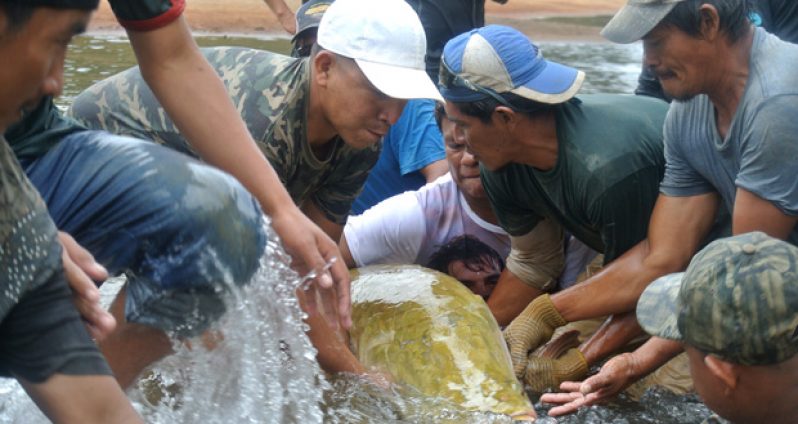This weekend, Annai’s Radio Paiwomak commenced broadcasting messages to Rupununi residents within the 65 miles of its radius regarding the hazardous effects of fires, some of which are being lit by persons, as the El Nino weather phenomenon continues to bake the region.

Reports are that fires, some of which were ignited by the sunny conditions experienced in the region several weeks now, have been raging across sections of the region. Mike Williams of the North Rupununi District Development Board (NRDDB) told the Guyana Chronicle from Annai yesterday that cloudy conditions lined the skyline yesterday in an ongoing phenomenon experienced in the region and other parts of the country. He said the sunlight ‘peeped out’ around lunchtime yesterday, and residents are optimistic that the weather will change in the coming weeks.
Williams, returning to the area from the Coastland on Saturday, has said he observed several fires along the trail near the communities in the Annai district. These include Central Annai, Surama, Wowetta, Rupertee and Kwatamang.
Wowetta borders the Iwokrama Rainforest protected area, and Williams said protection of the tropical reserve is of great importance. “The fires can be detrimental to the eco-system and the general bio-diversity of the area,” he noted, adding that the broadcast on the radio frequency 97.1 includes information on the harm the fires can do to the protected areas. In addition, he noted that the general savannah landscape is of importance to the region.
He said some fires are being lit by persons, while others are brush fires caused by the hot and dry climatic conditions experienced throughout the region. “So we started broadcasting the effects the fires can have, urging persons not to light fires,” he noted.
At the moment, the Rupununi is experiencing one of its worst droughts in years. This newspaper reported this week that the Civil Defence Commission (CDC) has activated a National Response Mechanism to address the acute shortage of water being experienced in some sections of the country as a result of El Nino weather conditions.
At a post-Cabinet media briefing on Tuesday, Minister of Natural Resources, Raphael Trotman, reported that the situation was “grave” in Region 9 (Upper Takutu-Upper Essequibo), where there continues to be an acute shortage of water.
It was noted that the CDC was expected to meet with Cabinet on Thursday to fully brief President David Granger on the issue.
Meanwhile the NRDDB reported yesterday that the body and its partners were able to rescue 25 stranded arapaima fish from the “ponds” formed in and around the Rewa River, and take them to an improved habitat. This newspaper has reported on the team’s mission, which began last weekend.
According to a release from the NRDDB, water levels are so low in the Rupununi that the rescue team had to push and drag boats for over a day and a half to reach the stranded arapaimas. Members of the rescue team included residents from the villages of Rupertee and Rewa, an Iwokrama ranger, an NRDDB executive, and 5 students from the Bina Hill Institute. Fuel, rations, boats and engines were contributed by partners, including the NRDDB, Iwokrama, Dr. Lesley De Souza, Samantha James, Rewa Eco Lodge and families of team members involved.
The team successfully removed 25 adult fish, a few of which weighed over 350 lbs, from the dry ponds. The release stated that Ranger Peters reported that a seine was used to catch the fish, which were then placed in a canoe and dragged through the dry pond and the forest to the Rewa River. He said that all the fish were tagged so that they could be identified and tracked in future. This is part of research being conducted by Dr De Souza, who is working along with Rewa Eco Lodge to study arapaima fish and their behaviour.
This research will also provide information on how best Rewa can sustainably conduct sports fishing for arapaima without detriment to the fish.
The arapaima is the largest scaled fresh water fish in the world, and Guyana’s rivers are a last stronghold for these endangered fish. Arapaima can grow over 8 feet long and weigh in excess of 400 lbs; and unlike other fish, they come to the surface to breathe air, otherwise they drown.












